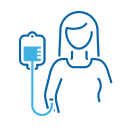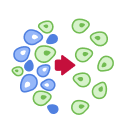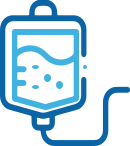What is CAR T?
Chimeric antigen receptor (CAR) T-cell therapy is an individualised, one-time treatment that is changing the way cancer is treated. Cell therapy technology uses the power of a patient’s own immune system to attack certain types of cancer cells.
Watch the video to learn more about the mechanism of action of CAR T-cell therapy.
Each cell therapy is uniquely designed for each patient, harnessing the power of the immune system to target and attack cancer. Our CAR T-cell therapy manufacturing process includes these 5 steps:

Step 1
Collect
patient’s white blood cells

Step 2
Isolate
and activate the T cells

Step 3
Engineer
the T cells with a chimeric antigen receptor (CAR) gene

Step 4
Grow
and expand the number of T cells
Step 5
Infuse
the same patient with engineered T cells
Patient Identification

CAR T-cell therapies are available for patients with certain forms of blood cancer. 1
Please note, the eligibility criteria for CAR T-cell therapy may vary to that of other systemic therapies. For further information, please see the eligibility criteria for Kite CAR T-cell therapies here. 1,2
University Hospitals Birmingham NHS Foundation Trust developed a regional lymphoma MDT with ~20 multidisciplinary healthcare professionals from local centres to discuss complex lymphoma patients. This results in patients being identified early and fosters efficient communication between centres.3
Referral

Once a patient has been identified as suitable for CAR T-cell therapy, a referral should be made to a CAR T-cell therapy centre. Timely referral is critical to ensure that patients can access treatment without delay. 1,2
Click here to see the centres in the UK and Ireland that are authorised to provide Kite CAR T-cell therapies.
Cell collection

T-cells are collected from the patient via apheresis, a process which separates the white blood cells from the circulating blood.1,2
Manufacturing

The collected T-cells are sent to manufacturing facilities, where they are isolated and genetically engineered into CAR T-cells.
These CAR T-cells are then transported back to the treatment centre ready to be infused into the patient.1,2
Pre-infusion

While the CAR T-cells are being manufactured, patients will often receive 'bridging' therapy (such as chemotherapy and/or radiotherapy) which aims to reduce the amount of disease and decrease the risk of cancer progression.
In the week prior to the CAR T infusion, the patient will receive 'conditioning therapy' that creates an environment in the patient that will allow the CAR T-cells to thrive.1,2
University Hospitals Bristol and Weston developed an ambulatory care service where the patients stays at home if living close-by or in other local accommodation and they visit the hospital daily for their lymphodepletion/conditioning therapy. This allows the CAR T centre to save 6 bed days per patient.3
Infusion

CAR T-cell therapy must be administered in an accredited treatment centre by a healthcare team experienced in using these treatments. The patient will be admitted to the hospital during the infusion and may receive medication before or after treatment to prevent and/or manage side effects that may occur from the CAR T-cell therapy.1,2
Monitoring

Patients must be monitored after infusion for signs and symptoms of potential side-effects that can occur following infusion with CAR T-cells. Usually a month after infusion, a healthcare professional will conduct a PET/CT scan to assess if the treatment has worked. Follow up scans/appointments will be scheduled depending on the patient's response and the clinical team's recommendations.1,2
University Hospitals Bristol and Weston developed a protocol where patients are discharged on Day 10+ after the CAR T infusion into accommodations near the hospital. The specialist nurse teams perform their checks at the offsite-accommodation, so the patient does not need to re-enter the hospital for daily monitoring.3
An educational resource for adult patients and their loved ones who have been referred for CAR T-cell therapy or are undergoing treatment with CAR T-cell therapy.
On this dedicated CAR T website designed by Kite, as well as information on what to expect, there is also advice from a CAR T patient for family and friends, and helpful tips when preparing for and undergoing treatment.

April 2025 UKI-YES-0058
Adverse events should be reported
Reporting forms and information can be found at www.mhra.gov.uk/yellowcard or via the Yellow Card app (download from the Apple App Store or Google Play Store). Adverse events should also be reported to Gilead to [email protected] or +44 (0) 1223 897500.